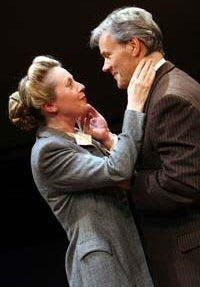There must be a whole strand of literature, starting with the classics, in which war heroes return to discover their wives remarried. To give Daphne du Maurier credit, she marginally avoids this cliché in The Years Between, although there are far too many others that she does not, in this sometimes prescient play written in 1943.
The writer is best known as a middlebrow novelist many of whose works (most memorably Rebecca) were turned into popular films, for the most part half a century or more ago. She has gone out of fashion and regrettably, on this showing, her work is very dated and possibly better suited to celluloid or paper than the stage.
In 1942, Colonel Michael Wentworth disappeared in a plane crash. In the nicest possible way, this allows his wife Diana (played by Karen Ascoe) and her next-door neighbour, gentleman-farmer Richard Llewellyn (Michael Lumsden), to become what was not in those days known as an item.
In this, the lady of the manor and her beau are encouraged by everybody that they meet including a government minister, a clergyman and his wife and even Diana's horribly priggish son, Robin.
On the opening night, Dominic Chelsom plays a boy who is 10, going on 40, speaking in the clipped tones of the incredibly well-to-do. He embraces his prospective stepfather with enthusiasm, seemingly a far better replacement for the original than a fishing rod that served the lonely boy as an early surrogate.
In an unusual plot twist, the multitalented colonel had also been a Member of Parliament for his fiefdom. Incredibly, almost halfway through the 20th century, his wife is both encouraged to take on his seat and elected to it unopposed. One had naively supposed that this kind of behaviour had disappeared with The Reform Act of 1832 or soon afterwards.
Diana takes to Parliamentary life like a duck to water, leaving her son in the capable hands of Richard. Like some putative Lady Thatcher, she makes speeches, appears on committees and does all that she can for the war effort; comfortable in the knowledge that hubby will never reappear.
One suspects that the original version of this play must have been a little different from the one now seen. If not, the writer was a seer, since not only did she guess that the Allies would win the war but more impressively, the date on which they would do so. Her script must even have prefigured Winston Churchill's victory speech.
By 1945, the shambling, blank-eyed wreck that is her husband, a seriously reactionary Colonel, played by Mark Tandy, has returned an unheralded war hero. Unfortunately, he is far from welcome in his own home and his tendency to pontificate and put down his wife is no longer acceptable as the country prepares for post-war egalitarianism.
The remainder of the play sees the heartache that this unlikely ménage à trois inevitably causes, as Diana has to choose between her two men and also a future as either a housewife or an MP.
Until the last two of the six acts, Caroline Smith's static production does little to bring a series of unlikely characters to life. She does not make the best use of the Orange Tree's facilities in the round either, at crucial moments leaving pairs of actors rooted to the spot so that depending upon your seating location, you can see the faces of neither as bad news is imparted.
This revival reveals Daphne du Maurier as far from the most talented of playwrights, although, to be fair, the biggest problem may well be that fashions have changed so much in the last sixty or so years.
